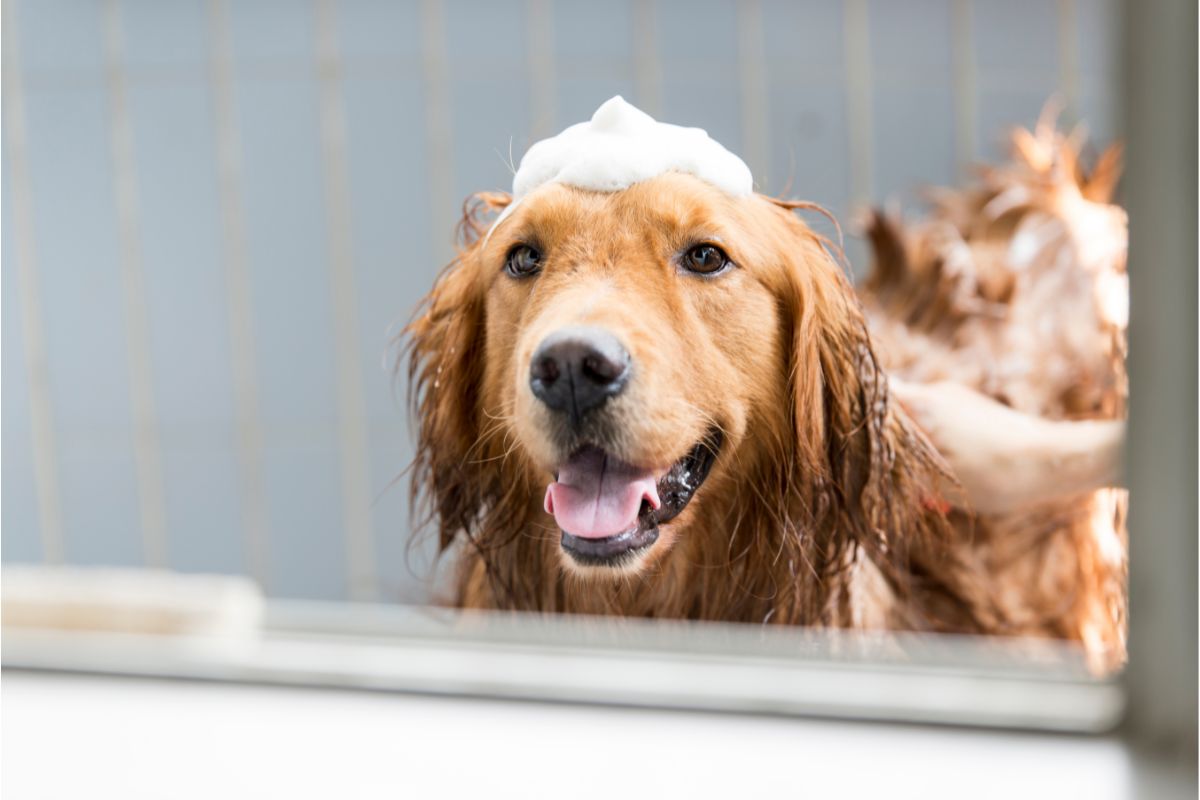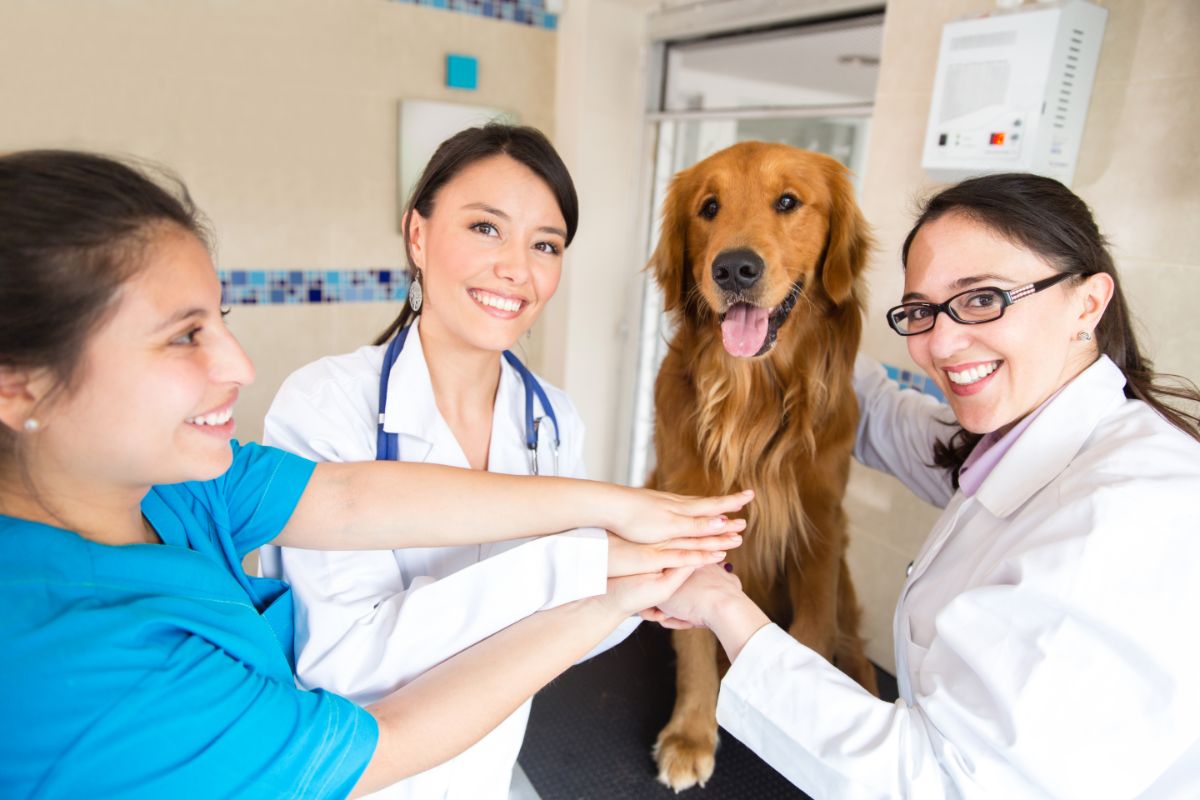Have you ever wondered why your Golden Retriever suddenly starts coughing? It can be pretty concerning, but don’t worry – I’m here to unravel your concern.
In this article, I’ll talk about the various reasons behind your furry friend’s coughing episodes. I’ll guide you through the common culprits, from allergies that might surprise you to potential respiratory issues.

I’m hoping to share insights to ensure that your four-legged friend stays as happy and healthy as can be. Let’s get started.
Common Causes Of Coughing In Dogs
You might be surprised to find that allergies play a significant role in your Golden Retriever’s coughing episodes.
Pollen, dust, or certain foods can trigger reactions.
Keep an eye out for any changes in your dog’s surroundings and season patterns to pinpoint potential allergens.
Respiratory infections are another culprit, often caused by bacteria or viruses. Keep an eye out for symptoms like nasal discharge or labored breathing.
Regular veterinary check-ups, especially during allergy-prone seasons, can aid in early detection and prevention.
By staying attuned to your Golden Retriever’s behavior and promptly addressing potential causes, you play a vital role in ensuring their lasting health and happiness.
Symptoms To Look Out For
In our shared commitment to the well-being of your Golden Retriever, it’s crucial to recognize the subtleties accompanying their coughing episodes.
Pay close attention to changes in behavior, as lethargy or a dip in appetite may signal an underlying issue.
Keep an eye on nasal discharge or changes in breathing patterns, as these can offer valuable clues about the nature of the cough.
Your observant eye serves as the frontline detector, allowing you to act swiftly in addressing your dog’s discomfort.
Regular grooming routines, including dental care, can also influence respiratory health. You may think this isn’t the case, but dental health can have a big impact.
By being vigilant and attuned to these symptoms, you can contribute significantly to the overall health of your furry friend.
When To Consult A Vet About Your Golden Coughing
Recognizing when it’s time to consult a veterinarian about your golden retriever coughing is crucial for the well-being of your dog.
If your dog’s coughing persists for more than a few days, intensifies, or is accompanied by additional symptoms like lethargy, loss of appetite, or nasal discharge, it’s a clear signal to seek professional advice.
A persistent cough might indicate an underlying health issue that requires specialized care.
Additionally, if your Golden Retriever is a puppy or a senior dog, their immune systems may be more vulnerable, warranting swifter veterinary attention.
Trust your instincts and don’t hesitate to reach out to your vet; they are your invaluable partner in safeguarding your Golden Retriever’s health and ensuring a happy, active life for years to come.
Home Remedies For A Coughing Dog
When it comes to your Golden Retriever’s well-being, incorporating home remedies into your caregiving routine can be a game-changer.
For minor coughing episodes, try increasing indoor humidity to ease respiratory discomfort – humidifiers work wonders.
Additionally, ensure your pup stays well-hydrated with a consistent supply of fresh water.
You could experiment with adding a small amount of honey to their diet; its natural soothing properties can be beneficial. However, exercise caution and consult your vet before introducing any dietary changes.
You should also consider creating a cozy, quiet space for your furry friend, minimizing stressors that might exacerbate coughing.
Regular grooming, especially during shedding seasons, can also reduce the likelihood of allergens clinging to their fur.
These simple yet effective home remedies, coupled with a keen eye on your Golden Retriever’s overall health, contribute to a harmonious and comfortable life for your pup.
Kennel Cough In Golden Retrievers
Of course, one condition we have to spend a little time discussing is kennel cough.
This is akin to the common cold in humans but in our furry friends.
It’s highly contagious and often picked up in places where dogs gather, like kennels, dog parks, or social events.
What Exactly Is Kennel Cough?
Kennel Cough, scientifically known as canine infectious tracheobronchitis, is mostly caused by the Bordetella bronchiseptica bacterium. It’s characterized by a persistent, forceful cough that can sometimes sound like your dog is choking.
This disease spreads through airborne droplets, direct contact, or even shared dog toys and bowls. It thrives in crowded environments with poor ventilation – a common scenario in many kennels.
Symptoms To Watch For
If your Golden starts displaying a harsh, hacking cough, it could be a sign of Kennel Cough.
Additionally, watch for symptoms like a runny nose, sneezing, and, in some cases, a mild fever.
Despite these symptoms, they often maintain their normal playfulness and appetite.
Home Care And When To See The Vet
Most cases of Kennel Cough are mild and can be managed at home.
It’s essential to ensure your Golden Retriever gets ample rest and stays hydrated.
However, if symptoms persist or worsen, or if your dog shows signs of lethargy or loss of appetite, it’s time to consult the vet.
Personally, I would speak to a vet regardless, especially where pups and senior dogs are concerned, as their immune systems might not be as robust.
Preventive Measures
Prevention is key. Vaccination against Kennel Cough is available and highly recommended, especially if your dog regularly interacts with other dogs.
Also, maintaining a clean environment and avoiding crowded dog areas during outbreaks can significantly reduce the risk of your Golden contracting this condition.

Breed-Specific Considerations And Coughing
When it comes to Golden Retrievers, you need to consider the breed-specific information before deciding what to do with your coughing dog.
Goldens’ love for water and swimming can expose them to potential respiratory irritants or infections. Make sure to monitor their aquatic adventures closely, ensuring they don’t ingest water containing harmful substances.
Additionally, their predisposition to allergies, notably food sensitivities, can manifest in coughing. Always opt for high-quality, hypoallergenic diets and steer clear of common allergens.
Golden Retrievers, known for their exuberant playfulness, may inadvertently inhale objects, leading to coughing. Regularly inspect their play areas for potential hazards such as dust or fur build-ups or small/broken toys.
As a responsible pet owner, understanding these breed-specific nuances allows you to keep a closer eye on your dog and keep them cough-free.
Preventative Measures
Adopting preventative measures could be a lifesaver in safeguarding your Golden Retriever from persistent coughing.
As I’ve mentioned, regular grooming stands out as a simple yet effective practice, minimizing the accumulation of potential irritants in their fur.
Maintaining a clean living environment, free from dust and allergens, significantly contributes to their respiratory well-being.
Schedule routine vet visits to catch any emerging health concerns early on, ensuring a proactive approach to their overall care.
Additionally, prioritize a balanced diet rich in nutrients, bolstering their immune system against potential respiratory threats.
By incorporating these measures into your furry friend’s routine, you actively contribute to their lasting and cough-free existence.
The Final Woof
Being attuned to the nuances of your Golden Retriever’s coughing is a cornerstone of responsible pet ownership.
By unraveling the common causes and implementing preventative measures, you actively contribute to their well-being.
Regular veterinary consultations, a keen eye on environmental factors, and swift action in the face of symptoms ensure a healthier, happier life for your four-legged friend.
Remember, your role in understanding and addressing your Golden’s health is paramount, reinforcing the bond between you and your dog.
And don’t ever hesitate to speak to your vet – it’s always better to be safe than sorry.
Frequently Asked Questions
Yes, allergies can manifest at any age. Monitor changes in behavior or symptoms, and consult your vet if you suspect allergies. Allergy testing may be recommended for a more accurate diagnosis.
Yes, respiratory infections can range from mild to severe. Timely veterinary intervention is crucial to prevent complications. Follow prescribed medications and care instructions for a speedy recovery.








